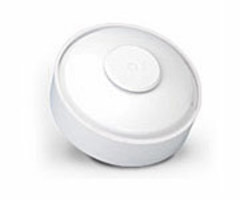Smoke Detector vs. Heat Detector
Smoke detectors and heat detectors are both used to detect fires. When one of these sensors is paired with an alarm system, it will send an alert to the panel when activated. This will cause an alarm event on the system. This will cause all sounders and sirens to activate to alert everyone.
The difference between smoke detectors and heat detectors is how they activate. Smoke detectors activate when they detect smoke, and heat detectors activate when they detect high temperatures or temperatures that are rising unusually fast. In most cases, a smoke detector will detect a fire more quickly than a heat detector. But there are some situations where it is better to use heat detectors. But for most situations, a smoke detector will work just fine. There are also combination smoke and heat detectors that offer both functions.
Smoke detectors generally fall into one of two categories. These are photoelectric smoke detectors and ionization smoke detectors. A photoelectric smoke detector works by using a small internal light. When smoke enters the chamber, the light will refract. The disruption of the internal light tells the sensor to activate and alert the system.
Meanwhile, an ionization smoke detector has two internal electrically charged plates with a small amount of radioactive material in-between them. If smoke enters the chamber, it will disrupt the current flow and activate the sensor. Generally speaking, photoelectric smoke detectors are a little more reliable than ionization smoke detectors, but both work quite effectively.
Heat detectors also fall into two main categories. There are fixed heat detectors and rate-of-rise heat detectors. Fixed heat detectors respond upon detecting an extremely high temperature that would only be present with a fire. Meanwhile, rate-of-rise heat detectors respond when the temperature rises unusually fast, such as 10 degrees Fahrenheit in a single minute. There are also some combination heat sensors that offer both functions.
Generally speaking, the best practice is to use combination smoke and heat detectors, such as the Honeywell 5808W3. But there are cases where you might want to use a standalone smoke detector or a standalone heat detector. If you live in a very hot area where temperatures regularly exceed 110 degrees Fahrenheit, you might want to avoid using a heat detector to prevent false alarms.
Meanwhile, standalone heat sensors can be best-suited for areas with fine-particles or heavy dust or moisture that may cause false activations. Some of the areas where standalone heat sensors tend to work best include bathrooms, attics and garages. They are also great for kitchens, where cooking food may accidentally set of a smoke sensor.
Did you find this answer useful?
We offer alarm monitoring as low as $10 / month
Click Here to Learn MoreRelated Products
Related Categories
- Heat Detectors
- Wireless Heat Detectors
- Smoke & Heat Detectors
- Smoke Detectors
- Wireless Smoke Detectors
- Combination Smoke/Heat Detectors
- PowerG Smoke Detectors
- PowerG Heat Detectors
- 2-Wire Heat Detectors
- Wired Heat Detectors
- Wired Smoke Detectors
- 2-Wire Smoke Detectors
- Honeywell 5800 Smoke Detectors
- Heat Alarm Sensors for Garages
- Wired Smoke Detector Interface Modules
- Battery Operated Heat Alarm Sensors
- Honeywell 5800 Heat Detectors
- 4-Wire Smoke Detectors
- 4-Wire Heat Detectors
- High Voltage Wired Smoke Detectors
- Honeywell SiX Heat Detectors
- Honeywell SiX Smoke Detectors
- Answered



